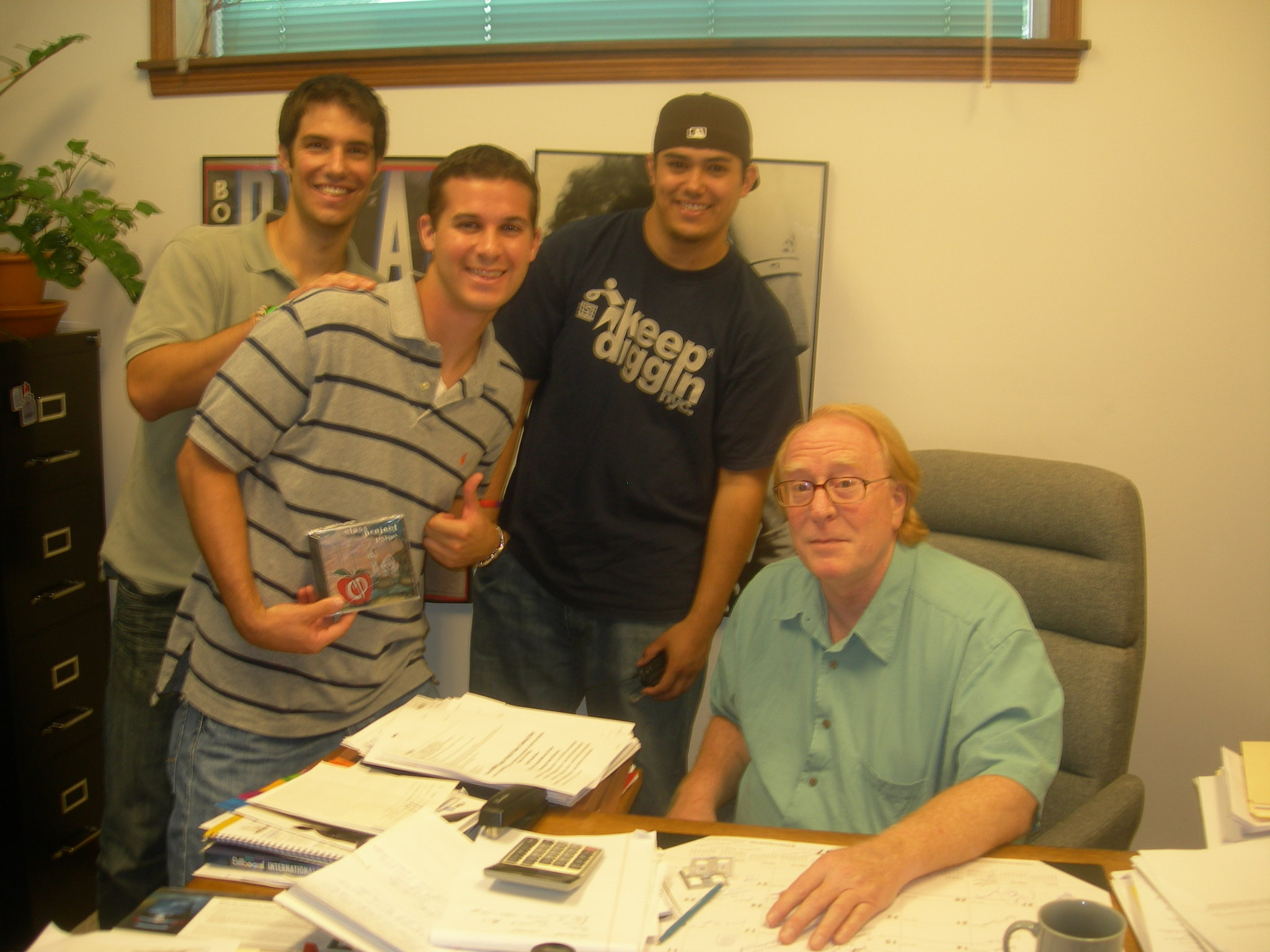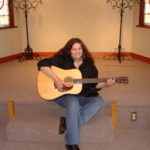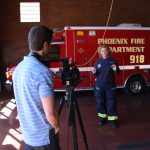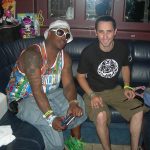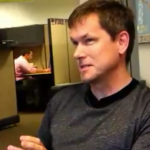In 1968, at 22, Keith Covart and two friends founded Electric Fetus, an independent-minded record store in Minneapolis, MN. Nearly four decades later, Keith is the sole-owner of the thriving store, to which he added two new Minnesota locations, in Duluth and St. Cloud. When asked his motivations for starting the store, Keith says, “I certainly wasn’t thinking as much about business as I was about music.” Following that direction, or lack thereof, Keith has shaped a customer-centric music store concerned more with what is for sale, than how much is sold.
Keith spent 2 years juggling a second career as a claims adjuster before realizing that he must commit himself to his passion. “Play music you want to play,” Keith says with a smile, “And that’s your job.”
Without an advance business degree, Keith is as suited as any to run a company. “Customer service,” he says, “Is not an MBA term.” By maintaining a “wonderful staff devoted to the store,” Keith is able to offer music to “every segment of the population.” Asked for the secret to employing knowledgeable and motivated individuals, Keith says simply, “We like each other more than many stores.”
Interview
We had Prince in here and we got voted best concert of the year.
There’s no place you can get more up close to your favorite band than in a store. And they generally sign afterwards. They sign albums, pieces of paper, something personal to you.
Country music has a lot of up close meetings with their people. Rock is just not that way usually. So it’s inmate.
B: So let’s see. At 22 years old, where were you in your whole career situation. Where did you think you were going to go with your life.
22?
B: Yeah.
Started Electric Fetus.
B: That was in 1968?
’68.
B: So did you have any hesitation to start this?
It was three of us partners at the time. Roger, a friend of mine, just asked if I wanted to get involved in it. I was already spending my rent money on music. I might as well get it wholesale. I mean, that’s not a big plan (laughs). That was what we did.
B: So you just started buying up all these records?
At the time, no one was addressing full albums. It was all Top 40 music and what you heard on the radio. I think was a big difference because full albums are all we concentrated on. We didn’t have singles. We didn’t have just the hits. In fact, we didn’t have the hits (laughs).
We started out with less titles of albums as you have CD’s today. We couldn’t have had more than $1500 worth of music. Certainly have more pieces today, but it still was a few hundred pieces were all we had.
B: So when you started this thing up, did you ever thing it would get to where it is now?
I really didn’t have any big plan. I didn’t have a five year business plan. I certainly wasn’t an MBA. I wasn’t thinking about business as much as I was thinking about music.
B: That’s awesome.
I mean, I had another job. I wasn’t reliant on the store to be my only source of income. I worked over by the U at the time. I pretty much opened at noon and stayed open until midnight. Or whenever customers stopped coming. We didn’t have set, store hours (laughs). We were just open. No one really came much before noon. I got most of my job done by one or two. My partners would work then, and I’d work later at night.
Z: Were you a musician at the time?
No. I barely played the radio.
B: So when did it become sustainable where you could leave your other job and focus on this full time?
It was pretty evident. I just couldn’t do both. The decision is where to concentrate your energies.
B: So many years after you started did you focus all your energies on Electric Fetus?
I think it was about two years.
B: So what’s been the highlight for you over these years with this record store?
I think especially in the beginning when I was working the floor before I lost my hearing.
I mean, playing music that you want to play, and that’s your job? That’s pretty cool.
In general, most of the customers you got to know. Friends come in. You sell music to your friends? Not a bad deal.
B: So what’s the one thing that you’ve learned about business and the music industry?
That it becomes business after awhile (laughs). That you have to have rules and regulations just like any other business. Customer service is not just a term that’s taught in an MBA class. It’s important. It’s what you do. You go beyond what the other stores are doing. You might look up something that takes you fifteen minutes through databases and everything else. You’re not even expecting a sale on it. They might say thank you and go to the library and get it. They might go online and get it. They might find out it’s not available anymore and they have to hunt used copies on the internet to see if it’s even buyable anymore.
Z: What makes this record store so special? Because a lot of the smaller record stores have fallen off with Sam Goody and the fact you can buy your music online.
I think we have the best selection in Minnesota. That helps to know that if you’re going to look for a piece, we probably have it, or we’ll find it. People know that right away.
I think we have connected to the community really well. It isn’t just a big chain that just throws everything at you. Sam Goody is more of a ‘top.’ They never had real depth. You look at some of the bigger independent chains. They have everything. Classics and classical and musicals. They have everything. But the margin in music was just too low to keep that going. You can’t have everything.
We try to connect. We have a great selection out there, but it’s more geared to our Minneapolis crowd. It isn’t everything. You wouldn’t come here and find show tunes. We have some, but not extensive.
Z: Have your musical tastes evolved a lot since you’ve opened the store until now. Or have you opened a lot of the same stuff. You still have the Bob Dylan posters up.
There’s always the new favorite album you never heard so you keep listening. I wouldn’t say it’s new music, but recently Funk Brothers released their Detroit Sound album. They were always background guys. They got Joan Osborne and different people to sing some of the hits from Motown. These same ones that are still alive are the musicians that are playing. They kind of honor them. It’s a great CD. We sell a lot of it because our demographics are people my age and younger and older. It’s a pretty eclectic crowd here. It isn’t just Top 40 kids coming in. It’s all ages. I think that’s probably why we’re still around too. It isn’t just one sector of the population coming here. It’s every segment.
B: So when that time where you were just starting up this record store, that two years where you had to get the side job to get this really going, was there any other time that you had another job? Or was it all doing this record store?
Well since I was 15 I worked. How do you mean by that?
B: Like, have you focused on this full time since you left that one job?
Oh yeah. This has been the sole source of making a living, I guess.
J: Quick question. You guys kind of touched on it a little bit. I was curious about what the increase in digital music sales. How have you responded to that, and how have you been able to overcome it?
Well, we don’t sell as many CD’s as we used to. The gift section is bigger than it used to be. We did put that mix and burn out there. You can mix your own CD’s. You don’t have to buy a whole album. You can just buy a single. You can put together your favorites. Title the album anything you want. Download the whole album. That’s CD quality. We’ll eventually have to get MP3 type of incrypted technology where they’re already burned over the internet. Plug another iPod in and in September we’re meeting with some other key stores in the community. We’re going to collaborate because you can’t afford it individually. As a group we’ll be entertaining that. It’s been hard for us to accept MP3 quality. Now if you’re listening to your computer with a small speaker, you’re not noticing much difference. If you want to hear base that goes right through ya, you want a CD and a good stereo system. It just depends on if you’re on the computer as background music, it’s fine. There’s still a lot of people that care about music to get the total fidelity. You see the LP’s are coming back. They like the warmth of an LP. It matters to some people. We can’t be everything to everybody. We are what we are, I guess.
J: And the organization is called Sims?
Sims. Colliation of independent music stores. We’ve been part of that for fourteen years, I guess.
Z: So when you first quit the last job you had to open this store, do you remember just being super stoked when you realized this was going to be your job? Or were you scared that you weren’t going to be able to do it for very long?
It was just too hectic doing two jobs. Two totally different worlds. Suit world and a jeans world. I had to figure out what world I was going to be in.
Z: So what was the other job?
Claim adjuster.
Z: Not quite as fun as owning a record store?
Well, you’re still dealing with people. But it’s a totally different atmosphere for sure.
B: And did people think you were kind of crazy to venture out from a real job as a claim adjuster to owning your own record store?
You know, I never had the family judgment that I should do this. I don’t know. I probably should have had someone questioning me (laughs). But I never did. It was just all about what I was doing next. I trusted my instincts, I guess. Behind my back someone probably said I was crazy. But that never filtered to me.
B: So if you could go back to when you were just starting this record store up, at 22 years old, and just tell yourself one piece of advice, what would you say to your 22 year old self?
Don’t do it (Laughs). No I’d still do it. Probably. I certainly would like the experience of knowing what not to do. I didn’t have any accounting. I had to do everything on the wing. We got our bank statements and figured them out and tried to put together what our sales were and if we made money or not. Pretty close on, we hired an accounting person. Maybe the first person we hired was a clerk out in the store, but second person we hired was an accountant. It’s tough to figure out your taxes, especially when you are a partnership and you have your personal income as your business. That got real convuluded because different people had different percentages. We were smart enough to know we needed help. Too dumb to do it, but smart enough to know we needed help.
B: So it was a crash course in entrepreneurship.
It’s good to start out doing it yourself so you understand the information you’re getting. There’s terminology you don’t know. Turns in music, turns in your inventory. You’re like, ‘What are you talking about?’ Well, it’s how many times you sell your music. They had to talk to me in English language for me to understand it. But it’s a learning process.
B: When did the idea to have artists come in the store come about? And how?
We always did. We always had new local artists go into music venues over the years. Some of the musicians wives worked for us. We were pretty well connected to the music scene. So it was almost immediately that we local musicians playing in the store.
Z: How do you keep up with new music? Are you very into it? Or do you rely on the staff that comes in?
Oh totally rely on the staff.
Z: So when you interview for new employees, is that how you judge?
I wouldn’t be the guy to test. We’ll list different artists and we ask them to put them in the genre of music an artist would be in. Another one listing out what instruments the artist plays. What category of music will get the artist and album title with what type of music it is. How would you alphabetize this? Because groups are…Dark Side of the Moon starts with ‘D.’ John Henley would start with ‘H.’ Last name is how we store it. So we put a bunch of ‘H’s’ together and ask them how they would alphabetize this. It’s about a three page questionnaire.
Z: That’s pretty important though is maintaining a staff that knows a lot about music?
Oh yeah. Wonderful staff out there. They’re devoted to music. Anyone who takes that test deserves a job. It’s a tough test.
J: Where did the name come from? It’s a very intriguing name?
In 1968. I know you guys weren’t there. But it made a lot of sense back then (laughs). It just didn’t even…it was like yeah. Ok. Sure. Why not?
Z: So you still have partners?
No. All the smart ones left (laughs).
B: Well these guys are musicians. They’re rappers.
N: Do you know Rhymesayers?
Oh yeah. Slug used to work here. Worked here for five and a half years.
Z: Is he is a good guy?
Slug’s a great guy. I’ll be on record with that. He always took a lot of time with the customers out there. He wasn’t arrogant about things.
Noah: He has a store out there too right?
Yeah. Fifth Element.
Noah: Are they along the same lines as Electric Fetus?
It’s more of an urban store. Strickly urban.
Noah: But it’s an independent.
Yeah. They buy some wholesale product from us. We have a good relationship.
Z: Do you try to be here for most of the in store music performances?
I’m not anymore. I have to admit. I let the staff do it. Depends on who it is.
N: You should watch Kwali tomorrow. He’s fun.
Okay.
Brett: Well thanks for your time.
Yeah. I don’t know how I helped you. But you gotta follow, oh man, there’s this one writer who I can’t pull his name up…but you have to follow your bliss. That was his statement to all young kids. I couldn’t say it any better than that.
Z: You seem kind of laid back. Does all this come pretty natural to you because you love music? Or was opening a music store a real struggle? Or did it make sense at the time?
You start out small and evolve. You got friends working for you and they all want to do more than clerking. You really grow for your people. You have to grow to stay in business. We have two other stores. It really creates more jobs. I’ve got people who have been with me for thirty-five years. I mean twenty years, thirty years. We’ve all evolved. If I was 22 and someone threw me into this, it’d fold in a week. It wouldn’t have been anything I understood, nor would I have wanted eighty employees with eighty questions, problems, all the things that go with it. Personnel, health insurance and all the costs of that. It’s a business. Same as any other business. I think we’re more in tuned to our customer and like each other more than other businesses. That’s the only difference, I would say.
Z: Well it’s got to be cool having a product like music as opposed to selling insurance. You get to walk in every day and surround yourself with CD’s and music.
It’s better than selling widgets, yeah (laughs). You can’t listen to widgets.
My name is Keith Covart. I was forced into this conversation by my niece. I’m under totally duress. But I’ll give permission.
